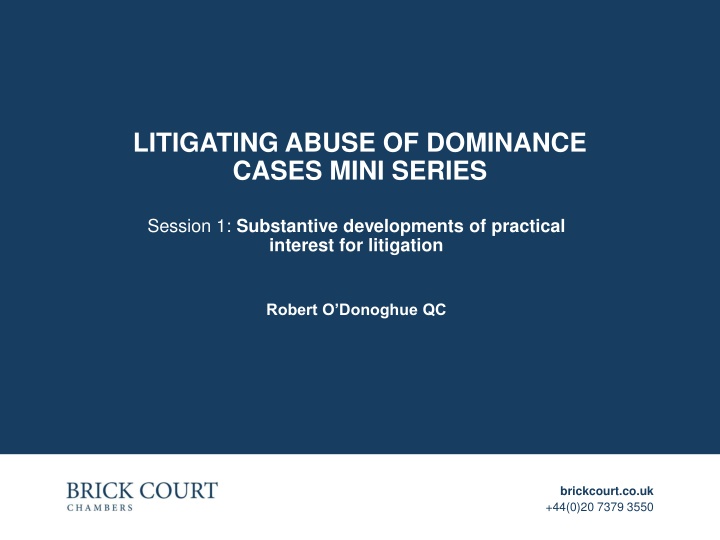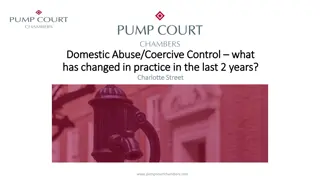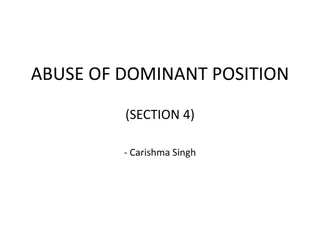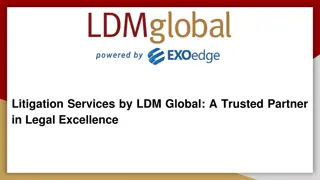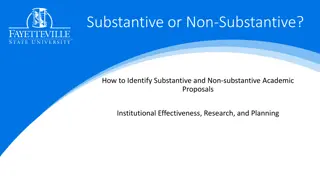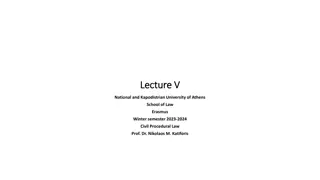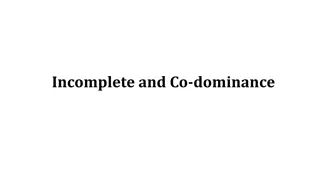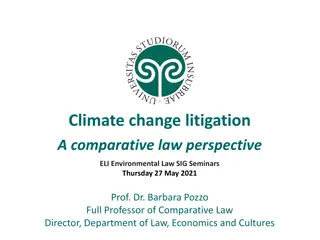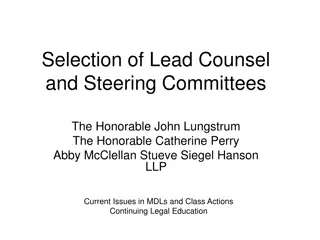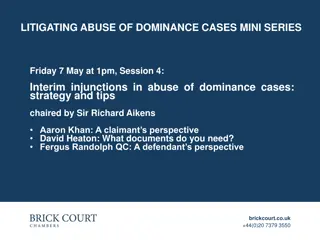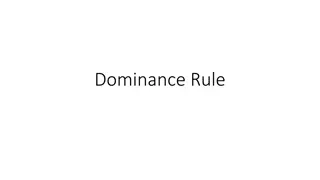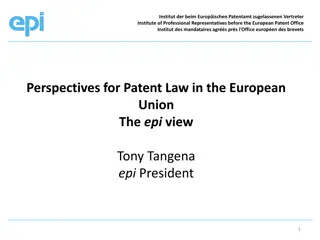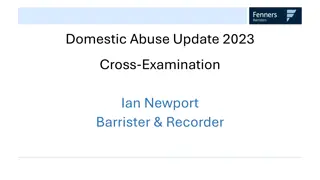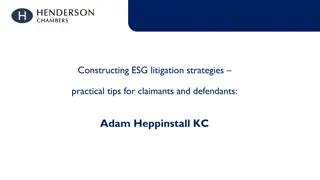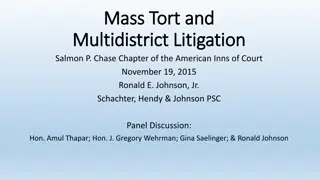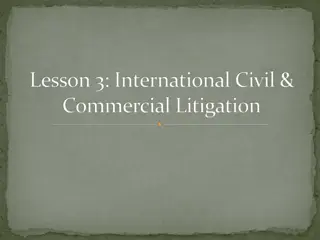Litigating Abuse of Dominance: Substantive Developments for Practical Litigation
Early enforcement under Ch. 2/Art. 102 TFEU focused on specific abuse categories, but a more fluid approach is emerging. Implications for litigation include potential claimant benefits from a freewheeling approach, while defendants must still consider established case law categories. The evolution may impact strike-out judgments and trials, where novelty could present challenges. Ultimately, trial outcomes hinge on merits and evidence.
Download Presentation

Please find below an Image/Link to download the presentation.
The content on the website is provided AS IS for your information and personal use only. It may not be sold, licensed, or shared on other websites without obtaining consent from the author.If you encounter any issues during the download, it is possible that the publisher has removed the file from their server.
You are allowed to download the files provided on this website for personal or commercial use, subject to the condition that they are used lawfully. All files are the property of their respective owners.
The content on the website is provided AS IS for your information and personal use only. It may not be sold, licensed, or shared on other websites without obtaining consent from the author.
E N D
Presentation Transcript
LITIGATING ABUSE OF DOMINANCE CASES MINI SERIES Session 1: Substantive developments of practical interest for litigation Robert O Donoghue QC brickcourt.co.uk +44(0)20 7379 3550
LITIGATING ABUSE OF DOMINANCE CASES MINI SERIES Monday 12 April at 5pm, Session 1: Substantive developments of practical interest for litigation, chaired by Dame Kelyn Bacon DBE Thursday 22 April at 1pm, Session 2: Abuses & pharmaceuticals: recent & current issues in litigation, chaired by Lord Anderson of Ipswich KBE QC Wednesday 28 April at 1pm, Session 3: Litigating big tech/big data abuses, chaired by Sir Nicholas Forwood Friday 7 May at 1pm, Session 4: Interim injunctions in abuse of dominance cases: strategy and tips, chaired by Sir Richard Aikens Tuesday 11 May at 1pm, Session 5: Regulatory appeals, chaired by Sir Gerald Barling brickcourt.co.uk +44(0)20 7379 3550
ISSUE #1: THE DEATH OF THE PIGEON HOLE? Early decades of Ch. 2/Art. 102 TFEU enforcement concerned with careful development of categories, or at least conditions, for abuse (e.g., refusal to deal, predation, tying) Trend now seems to be away for pigeon hole approach and towards greater fluidity: Purple Parking, 79 (approved in Streetmap 61): [Heathrow] submissions require one to treat each of those examples, and the essential facilities type of abuse, as being individual pigeon- holes into which one must fit a case, and having thus fitted it to fulfil a list of criteria said to be applicable to that pigeon-hole. That is an erroneous approach. The statutory examples, and those developed by subsequent case law, are ways in which the basic wrong can be committed, but at all times an eye must be kept on the basic wrong itself. Baltic Railway, 177: LG has abused its dominant position on the Lithuanian market for the management of railway infrastructure by removing without objective justification the Track in the legal and factual circumstances described below thereby giving rise to potential anti-competitive effects on the relevant market for the provision of rail transport services for oil products by raising barriers to market entry. Slovak Telekom, CJEU (2021), 45: The imposition of those [Bronner] conditions was justified by the specific circumstances of that case which consisted in a refusal by a dominant undertaking to give a competitor access to infrastructure that it had developed for the needs of its own business, to the exclusion of any other conduct. Development of new object abuses brickcourt.co.uk +44(0)20 7379 3550
ISSUE #1: THE DEATH OF THE PIGEON HOLE? Implications for litigation: More freewheeling approach to abuses may be more claimant-friendly? But defendants should remind Court that case law categories and conditions still matter where the case law contains a principle which says that in factual situations of type X, condition Y must always be fulfilled even though it is not required in all other cases. (Purple Parking, 79) Implications for strike-out/reverse summary judgment, particularly in novel cases (Intel v Via) Novelty may come back to bite claimant at trial Ultimately, the merits, and evidence, will decide trials brickcourt.co.uk +44(0)20 7379 3550
ISSUE #2: THE RISE OF EXPLOITATIVE ABUSES Surprising revitalisation of exploitative price abuses: Aspen, Phenytoin, Hydrocortisone, Liothyronine Historic case law on unfair (non-price) conditions (BRT v Sabam, Tetra Pak II, AAMS, DSD) not widely used in practice But recent revitalisation in the context of platform cases: Match & Epic Games complaints to CMA Facebook Germany: unfair privacy demands Preventx v Royal Mail [2020] EWHC 2276, 95: The recent German Facebook decision indicates the potential breadth of this provision." brickcourt.co.uk +44(0)20 7379 3550
ISSUE #2: THE RISE OF EXPLOITATIVE ABUSES Implications for litigation: Unfairness of terms fairly gelatinous: case law conditions of necessity, proportionality, and objective justification hardly promote legal certainty Not clear one needs an effect on competition beyond unfairness: Preventx v Royal Mail [2020] EWHC 2276, 95 ( the authorities on excessive pricing, and the United Brands test, show that it is not necessary to show a distortion of competition to establish that form of exploitative abuse. If that is the position for the unfair prices limb of Art 102(a), it is not evident that a different approach should apply to the unfair trading conditions limb of this provision. ) But English courts unlikely to want to act as rate-setters or rewriting bargains: see Humber Oil Terminals Trustee v Associated British Ports [2011] EWHC 352 and Ineos Vinyls Ltd v Huntsman Petrochemicals (UK) Ltd [2006] EWHC 1241 (Ch), But unfair conditions likely to play a prominent role in platform cases, inc. on novel issues such as abusive competition on privacy. Query role of platform regulation in this regard? brickcourt.co.uk +44(0)20 7379 3550
ISSUE #3: THE SNAKES AND LADDERS OF DISCRIMINATION Breadth of non-discrimination clause in Ch. 2/Article 102 in theory enormous any difference leading to competitive disadvantage in comparable transactions unlawful. In practice, Courts and public authorities sensitive to scope for use and abuse of non-discrimination laws (cf. Robinson-Patman Act 1936) see, e.g., Post Danmark Recent MEO case likely to have mixed effects: On one hand, makes conditions more demanding, since disfavoured party needs to show compared parties compete with each other and that disfavoured party s total costs are (materially) affected: the mere presence of an immediate disadvantage affecting operators who were charged more, compared with the tariffs applied to their competitors for an equivalent service, does not, however, mean that competition is distorted or is capable of being distorted (CJEU, 26) On other hand, once this is shown, there is an abuse, subject to objective justification brickcourt.co.uk +44(0)20 7379 3550
ISSUE #3: THE SNAKES AND LADDERS OF DISCRIMINATION Important to distinguish cases where: Dominant firm supplies customers but does not compete with them secondary line injury (MEO) Vertical integration where dominant firm supplies customers who it also competes with primary line injury (Purple Parking) Primary line cases: Actual discrimination by dominant firm in favour of own downstream operations also treated harshly: see Case C-242/95, GT-Link, Case T- 228/97, Irish Sugar plc v CommissionE.ON Commitments Decision of 26 November 2008, GDF Commitments Decision of 3 December 2009 Purple Parking, where Court said claimant would have failed on refusal to deal principles but won on pure discrimination principles see 143. Subject to pending appeals like Google Shopping, also clear that the CMA and other competition authorities are likely to apply an expansive approach to self-preferencing discrimination in platform cases brickcourt.co.uk +44(0)20 7379 3550
LITIGATING ABUSE OF DOMINANCE CASES MINI SERIES Session 1: Substantive Developments of Practical Interest for Litigation David Bailey Professor of Practice, King s College London brickcourt.co.uk +44(0)20 7379 3550
LITIGATING ABUSE OF DOMINANCE CASES ISSUE #4: THE CONCEPT OF AN ABUSE BY OBJECT brickcourt.co.uk +44(0)20 7379 3550
LITIGATING ABUSE OF DOMINANCE CASES WHAT IS AN ABUSE BY OBJECT ? WHERE DOES IT COME FROM? GC IN INTEL (2016), 205 GC IN LITHUANIAN RAILWAYS (2020), 99 WHY IS IT IMPORTANT FOR LITIGATION? LIABILITY: LIKELY TO BE ANTI-COMPETITIVE & UNLIKELY TO BE JUSTIFIED EVIDENCE: FOCUS ON THE PURPOSE OF A DOMINANT FIRM S CONDUCT brickcourt.co.uk +44(0)20 7379 3550
LITIGATING ABUSE OF DOMINANCE CASES brickcourt.co.uk +44(0)20 7379 3550
LITIGATING ABUSE OF DOMINANCE CASES ISSUE #5: PROTECTION OF LESS EFFICIENT COMPETITORS brickcourt.co.uk +44(0)20 7379 3550
LITIGATING ABUSE OF DOMINANCE CASES WHAT IS A LESS EFFICIENT COMPETITOR? WHERE DOES THE PROTECTION OF LESS EFFICIENT COMPETITORS COME FROM? CJEU IN POST DANMARK II (2015), 57 CAT IN ROYAL MAIL (2019), 487 WHY IS IT IMPORTANT FOR LITIGATION? INCREASES WHO CAN SUE / COMPLAIN MEANS THE AS-EFFICIENT COMPETITOR TEST IS NOT AN ABSOLUTE DEFENCE brickcourt.co.uk +44(0)20 7379 3550
LITIGATING ABUSE OF DOMINANCE CASES brickcourt.co.uk +44(0)20 7379 3550
LITIGATING ABUSE OF DOMINANCE CASES ISSUE #6: BREXIT brickcourt.co.uk +44(0)20 7379 3550
LITIGATING ABUSE OF DOMINANCE CASES BREXIT WHAT ARE ITS SUBSTANTIVE IMPLICATIONS? SECTION 58A OF THE COMPETITION ACT NB NOW LIMITED TO COMMISSION DECISIONS ADOPTED BEFORE BREXIT NB CONTINUED COMPETENCE CASES : SI 2020/1343 SECTION 60A OF THE COMPETITION ACT CASE-LAW OF THE CJEU: NB s.60A(7) COMMISSION DECISIONS brickcourt.co.uk +44(0)20 7379 3550
LITIGATING ABUSE OF DOMINANCE CASES BREXIT WHAT ARE ITS PRACTICAL IMPLICATIONS? POSSIBLE DIVERGENCE WITH FUTURE EU CASE- LAW & PRACTICE, BUT HOW LIKELY? POSSIBLE TO BRING ACTIONS BASED UPON THE LAWS OF MEMBER STATES? POSSIBLE DIFFERENCES IN EVIDENTIAL STANDARDS TO PROVE AN ABUSE? brickcourt.co.uk +44(0)20 7379 3550
LITIGATING ABUSE OF DOMINANCE CASES MINI SERIES Session 1: : Substantive developments of practical interest for litigation Robert O Donoghue QC David Bailey Chaired by Mrs Justice Bacon brickcourt.co.uk +44(0)20 7379 3550
